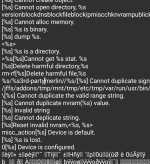Yota
Very Senior Member
@zitev @brendanp
I reported the GPL version to them in feedback, and told them that the GPL was provided to the Merlin author by Asus in advance.
The GPL version is: 386_50757
Your spam should be sent this way too.
But by the way, how do you check diskwrite log on that directory on your iOS? I don't think normal users can view that directory at all without jailbreaking.
The only solution is to not give execute permissions to the user partition, so that the user partition does not have to be scanned, or worry that there's enough malware stored there.
I reported the GPL version to them in feedback, and told them that the GPL was provided to the Merlin author by Asus in advance.
The GPL version is: 386_50757
Your spam should be sent this way too.
The asd (ASUS Security Daemon) we're talking about here has absolutely nothing to do with iOS or any other operating system.I have a few diskwrite log for this /usr path on iOS 16.2
But by the way, how do you check diskwrite log on that directory on your iOS? I don't think normal users can view that directory at all without jailbreaking.
That's why they should never bother with user partitions, Asus doesn't know what files a user puts there, maybe a certain user is a malware collector. what annoys me the most is that they designed the malware to delete it without even getting confirmation from the user, which is extremely intrusive behavior.asd scanned them and deleted all files of the form crt*[...]even though asd is supposed to be antimalware software, it is malware...
The only solution is to not give execute permissions to the user partition, so that the user partition does not have to be scanned, or worry that there's enough malware stored there.


